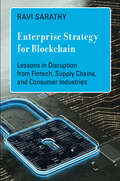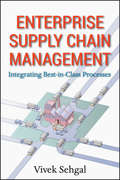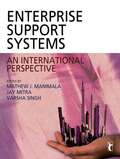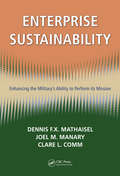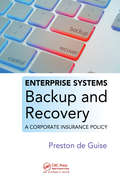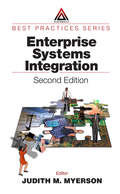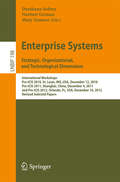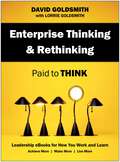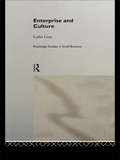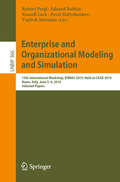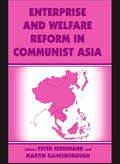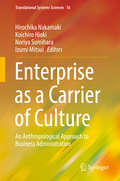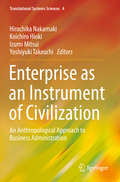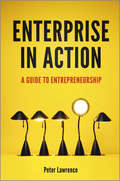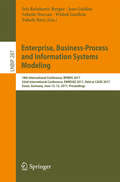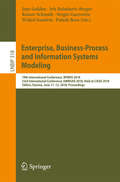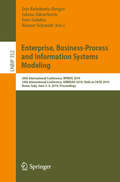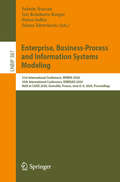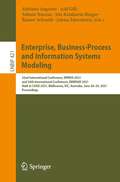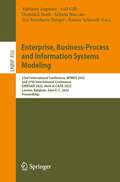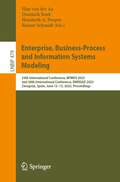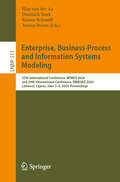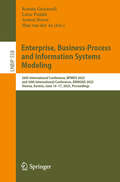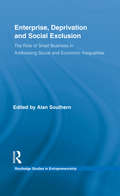- Table View
- List View
Enterprise Strategy for Blockchain: Lessons in Disruption from Fintech, Supply Chains, and Consumer Industries (Management on the Cutting Edge)
by Ravi SarathyHow companies can gain strategic advantage by developing blockchain capabilities.Blockchain is far more than cryptocurrency. Regarded for a decade as complex and with limited application, blockchain has now matured to be on the verge of fully realizing its disruptive potential. In Enterprise Strategy for Blockchain, business strategy expert Ravi Sarathy shows how companies can gain competitive advantage by developing and deploying blockchain capabilities. Sarathy explains what makes blockchain unique, including its capacities to eliminate intermediaries, guard against hackers, decentralize, and protect privacy. Presenting examples drawn from such sectors as finance, supply chains, computer services, consumer products, and entertainment, he describes how executives can strategically assess blockchain&’s applicability to their business. After outlining blockchain&’s technological features—and its technological obstacles—Sarathy describes disruptive technologies already happening in the financial services market with the emergence of decentralized finance, or DeFi, arguing that a wave of innovation might be positioning DeFi as blockchain&’s &“killer app.&” He also explores, among many other uses, a blockchain application that addresses chronic supply chain problems, pilot blockchain programs aimed at facilitating cross-border payments, and the use of NFTs (non-fungible tokens) that allow digital art to be collected and traded. And he outlines a path for organizations that includes establishing a business case for applying blockchain, evaluating enterprise cost-benefits, and preparing the organization to develop the requisite knowledge and people skills while overcoming resistance to change. Business leaders should invest, explore and experiment with blockchain now, positioning their organizations to be first in their fields, ahead of both rising startups and late-to-the game incumbent peers.
Enterprise Supply Chain Management
by Vivek SehgalPraise for Enterprise Supply Chain Management: Integrating Best-in-Class Processes"Enterprise Supply Chain Management: Integrating Best-in-Class Processes is a great primer on all things supply chain. This is a must-read for any IT, finance, business, or sales executive working for an organization where supply chain is a strategic discipline."--David Landau, Vice President, Manhattan Associates"This book provides a comprehensive mapping of supply chain processes and associated solution architecture. Its clarity and concise language makes it a definite read for anyone with a need to understand the bigger picture on supply chain management solutions and best practices. Equally suited for supply chain managers, IT managers, architects, and students looking forward to a career in supply chain management."--Yasser Alkazzaz, Senior Vice President of Supply Chain, Hatch Corporation (Canada)"Easily the best book for the practitioners who must understand the overall scope of supply chain functions, technology, and its impact on finance in an enterprise, without the need to get into the algorithms behind the supply chain solutions. The appendix on potential evolution of a green supply chain is thought-provoking for those pioneering carbon-aware supply chains."--Pervinder Joharformer, CTO and Executive Vice President, Manhattan Associates"Great book and especially relevant in these times when reducing expenses is vital given the current economic times. The book clearly explains how implementing the correct supply chain processes can help you to achieve your cost-reduction goals; and if you are someone whose job depends on achieving these goals, this is for you."--Henry Blum, Manager, Logistics Applications, Inc.Find out how your supply chain processes fit into your company's big picture--using best-in-class processesClearly written and foundational in approach, this book builds on fundamental concepts including:Why the heart of your supply chain is the flow of merchandiseThe wide scope of supply chain functions in your enterpriseClearly explained industry terms that demystify the jargonThe financial implications of supply chain managementThe ins and outs of demand and supply planning, transportation, and warehouse management, reverse logistics management, and collaborationEnterprise Supply Chain Management is filled with an abundance of examples that simplify and cover a wide scope of supply chain functions.
Enterprise Support Systems: An International Perspective
by Mathew J. Manimala, Jay Mitra and Varsha SinghEnterprise Support Systems: An International Perspective focuses on the issues surrounding enterprise support systems, giving a comprehensive understanding of how they influence enterprise creation and growth in various nations. Against the background of globalized economy, this collection covers issues pertaining to countries at diverse stages of enterprise development and offers valuable insights into the support needed at these stages. The chapters in this compilation present a comprehensive theoretical perspective on the formative and the facilitative environments of enterprise creation and development, emphasizing the two-way role of learning and education systems in bringing out a change within these systems. They deal with a range of issues that form the core of enterprise support systems, such as availability of finance, socio-cultural environment, personality dimensions, education systems, enterprise clusters and technology transfer. The theoretical debates raised by the issues discussed in this book will provide value-addition and solution-oriented tools for researchers, entrepreneurs, financiers, venture capitalists, trainers and educators.
Enterprise Sustainability: Enhancing the Military's Ability to Perform its Mission (Sustaining the Military Enterprise)
by Dennis F.X. Mathaisel Joel M. Manary Clare L. CommMilitary supply chains are unique because what is supplied to the end user is routinely returned to the supply chain for maintenance, repair, and overhaul (MRO). Offering a blueprint for transforming military depot workload and processes into those of high-performance commercial facilities, Enterprise Sustainability: Enhancing the Military‘s Abilit
Enterprise Systems Backup and Recovery: A Corporate Insurance Policy
by Preston de GuiseThe success of information backup systems does not rest on IT administrators alone. Rather, a well-designed backup system comes about only when several key factors coalesce-business involvement, IT acceptance, best practice designs, enterprise software, and reliable hardware. Enterprise Systems Backup and Recovery: A Corporate Insurance Policy prov
Enterprise Systems Integration
by Judith M. MyersonThe convergence of knowledge, technology, and human performance which comprises today's enterprise allows creative business process design. Thus, an organization can create new and innovative ways to service customers or to do business with suppliers and make itself a leader in its field. This capability relies on a successful strategy that integra
Enterprise Systems. Strategic, Organizational, and Technological Dimensions
by Darshana Sedera Norbert Gronau Mary SumnerThis book contains 15 thoroughly refereed research papers selected from 90 submissions for the 5th, 6th, and 7th International Workshop on Enterprise Systems, Pre-ICIS 2010-2012, held in St. Louis, MO, USA, in December 2010, in Shanghai, China, in December 2011, and in Orlando, FL, USA, in December 2012, respectively. In addition, two invited papers complete this volume. The contributions in this edited book are multidisciplinary in scope and cover strategic, organizational, and technological dimensions. They range from purely conceptual to literature reviews to papers on teaching-related aspects. Taken together, these papers provide a holistic view of the enterprise systems research domain, including key characteristics, implementation issues, general aspects of enterprise systems use, specific solutions such as CRM and SCM, and future research directions.
Enterprise Thinking & Rethinking: Paid to Think
by David GoldsmithUnderstand your true value to your organization by escaping self-limiting beliefs and learning about the 12 daily leadership activities that will enable you to more effectively lead others to desired outcomes and improve your performance as a leader and manager.
Enterprise and Culture (Routledge Studies in Entrepreneurship and Small Business #Vol. 4)
by Colin GrayEnterprise and Culture is a uniquely wide-ranging, insightful and well-informed critical evaluation of the economic and social project of creating an enterprise culture.Colin Gray argues that the failure of small enterprise policy is not just a question of economics, but is also caused by psychological and cultural factors. The book demonstrates that the individualism at the centre of enterprise culture policies is, itself, the main impediment to the successful growth and development of small enterprises.
Enterprise and Organizational Modeling and Simulation: 15th International Workshop, EOMAS 2019, Held at CAiSE 2019, Rome, Italy, June 3–4, 2019, Selected Papers (Lecture Notes in Business Information Processing #366)
by Eduard Babkin Robert Pergl Russell Lock Pavel Malyzhenkov Vojtěch MerunkaThis book constitutes the refereed proceedings of the 15th International Workshop on Enterprise and Organizational Modeling and Simulation, EOMAS 2019, held in Rome, Italy, in June 2019. The main focus of EOMAS is on the role, importance, and application of modeling and simulation within the extended organizational and enterprise context. The 12 full papers presented in this volume were carefully reviewed and selected from 25 submissions. They were organized in topical sections on conceptual modeling, enterprise engineering, and formal methods.
Enterprise and Trade in Victorian Britain: Essays in Historical Economics
by D. N. McCloskeyThe essays in this book focus on the controversies concerning Britain's economic performance between the mid-nineteenth century and the First World War. The overriding theme is that Britain's own resources were consistently more productive, more resilient and more successful than is normally assumed. And if the economy's achievement was considerable, the influence on it of external factors (trade, international competition, policy) were much less significant than is normally supposed. The book is structured as follows: Part One: The Method of Historical Economics Part Two: Enterprise in Late Victorian Britain Part Three: Britain in the World Economy, 1846-1913.
Enterprise and Welfare Reform in Communist Asia
by Peter Ferdinand Martin GainsboroughFeaturing a wide geographical scope, this collection of essays surveys enterprise and welfare reforms in all the remaining four Asian communist states: China, Vietnam, Laos and North Korea. Since the collapse of the Soviet Union they can no longer place major reliance upon assistance from other 'fraternal' states and have to devise their own strategies for survival. All have shown a trend towards greater reliance on market forces, though in different ways and to varying degrees. Enterprise management has to adapt to this. In some of them entrepreneurs have become politically and socially acceptable. They may even begin to set trends for social evolution. Yet since state entreprises used to be responsible for all welfare payments to employees and their families, management reforms cannot be separated from those of welfare arrangements. Reducing an enterprise's non-commerical obligations for the sake of greater market efficiency is bound to affect welfare provision. It also reopens the role of official trade unions. How these regimes cope with these conflicting pressures are vital factors in their long-term viability.
Enterprise as a Carrier of Culture: An Anthropological Approach to Business Administration (Translational Systems Sciences #16)
by Hirochika Nakamaki Koichiro Hioki Izumi Mitsui Noriya SumiharaThis book expands anthropological studies of business enterprise to include comparative and interdisciplinary perspectives. A number of books on business anthropology have been published, but most of them are written by anthropologists alone. By contrast, this book engages interdisciplinary studies, e.g., not only by anthropologists but also management scholars and other social scientists. It is the second volume of studies forwarding anthropological approaches to business administration, Keiei Jinruigaku. This volume focusses on the cultural dimensions of enterprise. Here enterprise is viewed as a medium carrying culture, rather than solely an entity of production and management, as is typical in mainstream studies. The approach is based on Tadao Umesao’s definition of culture as a projection of instruments/devices and institutions into the mental/spiritual dimensions of life. Therefore, in our view production and management are among the projections of the cultural aspects of enterprise. This perspective, we believe, constitutes a new frontier in the study of business administration. This book consists of three parts, the first being “religiosity and spirituality”, the second “exhibitions, performance and inducement,” and the third “history and story.” In Part I, Quaker Codes, ex-votos, and spiritual leadership are discussed in relation to management and behavior, and miracles and pilgrimage. Part II describes exhibitions justifying nuclear power industry within power plants in both Japan and England, the exhibition by English families of their porcelain collections, and the performance skills of orchestral maestros. All of these examples indicate that, through the use of narratives and myths, exhibits and performances overtly and covertly induce visitors or audiences to certain viewpoints and emotions. Part III offers examples of histories and stories of enterprise articulated through the branding and consumption of industrial products, and their display in enterprise museums where the essence of culture and heritage is cherished and emphasized, by and for the wider community and the enterprise itself. Conjoined as an interdisciplinary team of Western and Japanese researchers, we apply an anthropological approach to the cultural history of enterprise in both Britain and Japan.
Enterprise as an Instrument of Civilization: An Anthropological Approach to Business Administration (Translational Systems Sciences #4)
by Hirochika Nakamaki Koichiro Hioki Izumi Mitsui Yoshiyuki TakeuchiIn this book, the functions and dynamics of enterprises are explained with the use of anthropological methods. The chapters are based on anthropological research that has continued mainly as an inter-university research project, which is named Keiei Jinruigaku, of the National Museum of Ethnology (Japan) since 1993. These studies have a twofold aim: to clarify that enterprises are not only actors in economic activity but also actors that create culture and civilization; and to find the raison d'être of enterprises in a global society. Business anthropology is an approach to the investigation of various phenomena in enterprises and management using anthropological methodology (e.g., participant observations and interviews). Historically, its origin goes back to the 1920s–30s. In the Hawthorne experiments, the research group organized by Elton Mayo recruited an anthropologist, Lloyd W. Warner, and conducted research on human relations in the workplace by observation of participants. Since then, similar studies have been carried out in the United States and the United Kingdom. In Japan, however, such research is quite rare. Now, in addition to anthropological methods, the authors have employed multidisciplinary methods drawn from management, economics, and sociology. The research contained here can be characterized in these ways: (1) Research methods adopt interpretative approaches such as hermeneutic and/or narrative approaches rather than causal and functional explanations such as “cause–consequence” relationships. (2) Multidisciplinary approaches including qualitative research techniques are employed to investigate the total entity of enterprises, with their own cosmology. In this book, the totality of activities by enterprises are shown, including the relationship between religion and enterprise, corporate funerals, corporate museums, and the sacred space and/or mythology of enterprises. Part I provides introductions to Keiei Jinruigaku and Part II explains the theoretical characteristics of Keiei Jinruigaku. In addition, research topics and cases of Keiei Jinruigaku are presented in Part III.
Enterprise in Action
by Peter LawrenceAn authoritative guide to understanding and mastering the core issues and competencies involved in entrepreneurial successWhere do entrepreneurial opportunities arise? How do successful entrepreneurs exploit trends? What is the role of innovation in entrepreneurship? How do companies get started and become self-sustaining? Based on studies of 80 companies, including 30 Sunday Times Fast Track Companies, and 20 highly successful US entrepreneurial firms, this book answers these and many other key questions about entrepreneurship. This authoritative guide to the world of entrepreneurship offers valuable lessons for MBA students and established entrepreneurs alike.Shows practitioners how success is influenced by factors such as industry dynamics, entry barriers, reconfiguration, and core competenciesDelivers practical coverage of an array of key issues, including how to exploit trends, how to foster innovation, how to get additional funding for expansion, and much moreProvides expert guidance on how to successfully address each of the factors or core competencies coveredAn excellent supplement to standard graduate texts on the subject, it breathes new life into standard curriculum topics by presenting them within the context of real-world success stories
Enterprise, Business-Process and Information Systems Modeling: 18th International Conference, BPMDS 2017, 22nd International Conference, EMMSAD 2017, Held at CAiSE 2017, Essen, Germany, June 12-13, 2017, Proceedings (Lecture Notes in Business Information Processing #287)
by Iris Reinhartz-Berger, Jens Gulden, Selmin Nurcan, Wided Guédria and Palash BeraThis book constitutes the proceedings of two events held in conjunction with the CAiSE conferences and related to the areas of enterprise, business-process and information systems modeling: the 18th International Conference on Business Process Modeling, Development and Support, BPMDS 2017, and the 22nd International Conference on Evaluation and Modeling Methods for Systems Analysis and Development, EMMSAD, 2017. They took place in Essen, Germany, in June 2017. The focus theme for BPMDS 2017 papers was “Enabling Business Transformation by Business Process Modeling, Development and Support". From 24 submitted papers, 11 were finally accepted and organized by: Non-functional considerations in business processes; new challenges in business process modeling and support; testing business processes; business process model comprehension; an experience report on teaching business process modeling. The EMMSAD conference focuses on evaluating, exploring and enhancing modeling methods and techniques for the development of information and software systems, enterprises, and business processes. It received 25 submissions, from which 9 full and 2 short papers were selected and organized: evaluation and comparison of modeling languages and methods; modeling approaches to support decision making; behavioral specification and business process modeling; and modeling languages and methods in evolving context.
Enterprise, Business-Process and Information Systems Modeling: 19th International Conference, BPMDS 2018, 23rd International Conference, EMMSAD 2018, Held at CAiSE 2018, Tallinn, Estonia, June 11-12, 2018, Proceedings (Lecture Notes in Business Information Processing #318)
by Iris Reinhartz-Berger Rainer Schmidt Wided Guédria Sérgio Guerreiro Jens Gulden Palash BeraThis book constitutes the proceedings of two events held at the CAiSE conference and relating to the areas of enterprise, business process and information systems modeling: The 19th International Conference on Business Process Modeling, Development and Support, BPMDS 2018, and the 23rd International Conference on Evaluation and Modeling Methods for Systems Analysis and Development, EMMSAD 2018. The conferences took place in Tallinn, Estonia, in June 2018. The 13 papers accepted for BPMDS were carefully reviewed and selected from 29 submissions; for EMMSAD 6 papers out of 13 submissions were accepted for publication. For BPMDS 2018, the papers were organized in topical sections as follows: context-awareness in business processes; automatic analysis of business processes; advanced approaches for business process modeling; evaluation of business process modeling techniques; an experience report on modeling collaborative processes. For EMMSAD 2018, the six related papers are listed without further sections.
Enterprise, Business-Process and Information Systems Modeling: 20th International Conference, BPMDS 2019, 24th International Conference, EMMSAD 2019, Held at CAiSE 2019, Rome, Italy, June 3–4, 2019, Proceedings (Lecture Notes in Business Information Processing #352)
by Iris Reinhartz-Berger Rainer Schmidt Jens Gulden Jelena ZdravkovicThis book constitutes the proceedings of two events held at the CAiSE conference and relating to the areas of enterprise, business process and information systems modeling: The 20th International Conference on Business Process Modeling, Development and Support, BPMDS 2019, and the 24th International Conference on Evaluation and Modeling Methods for Systems Analysis and Development, EMMSAD 2019. The conferences took place in Rome, Italy, in June 2019. The 7 full and 2 short papers accepted for BPMDS were carefully reviewed and selected from a total of 20 submissions; for EMMSAD 15 full papers were accepted from 38 submissions. The papers were organized in topical sections named as follows: BPMDS: large and complex business process modeling and development; execution and understandability of declarative process models; novel approaches in enterprise modeling; transformative business process modeling, development, and support. EMMSAD: foundations of modeling and method engineering; enterprise process and capability modeling; information systems and requirements modeling; domain-specific and ontology modeling; and evaluation of modeling approaches.
Enterprise, Business-Process and Information Systems Modeling: 21st International Conference, BPMDS 2020, 25th International Conference, EMMSAD 2020, Held at CAiSE 2020, Grenoble, France, June 8–9, 2020, Proceedings (Lecture Notes in Business Information Processing #387)
by Selmin Nurcan Iris Reinhartz-Berger Pnina Soffer Jelena ZdravkovicThis book contains the proceedings of two long-running events held along with the CAiSE conference relating to the areas of enterprise, business-process and information systems modeling: * the 21st International Conference on Business Process Modeling, Development and Support, BPMDS 2020, and * the 25th International Conference on Exploring Modeling Methods for Systems Analysis and Development, EMMSAD 2020. The conferences were planned to take place in Grenoble, France, during June 8–9, 2020. They were held virtually due to the COVID-19 pandemic. For BPMDS 13 full papers and 1 short paper were carefully reviewed and selected for publication from a total of 30 submissions; for EMMSAD 11 full papers and 4 short papers were accepted from 29 submissions. The papers were organized in topical sections named as follows: BPMDS: Business process execution and monitoring, BPM applications in industry and practice, planning and scheduling in business processes, process mining, process models and visualizations EMMSAD: Requirements and method engineering, enterprise and business modeling, software-related modeling, domain-specific modeling, evaluation-related research.
Enterprise, Business-Process and Information Systems Modeling: 22nd International Conference, BPMDS 2021, and 26th International Conference, EMMSAD 2021, Held at CAiSE 2021, Melbourne, VIC, Australia, June 28–29, 2021, Proceedings (Lecture Notes in Business Information Processing #421)
by Selmin Nurcan Iris Reinhartz-Berger Rainer Schmidt Jelena Zdravkovic Adriano Augusto Asif GillThis book contains the proceedings of two long-running events held along with the CAiSE conference relating to the areas of enterprise, business-process and information systems modeling: * the 22nd International Conference on Business Process Modeling, Development and Support, BPMDS 2021, and * the 26th International Conference on Exploring Modeling Methods for Systems Analysis and Development, EMMSAD 2021. The conferences were planned to take place in Melbourne, Australia, during June 28–29, 2021, but changed to an online format due to the COVID-19 pandemic. For BPMDS 10 full papers and 1 short paper were carefully reviewed and selected for publication from a total of 26 submissions; for EMMSAD 13 full papers and 1 short paper were accepted from 34 submissions. The papers were organized in topical sections as follows: BPMDS: Improving event data quality in coherence with business requirements; enhancing the value of data in processes improvement; event stream and predictive monitoring; modeling languages and reference models; EMMSAD: Enterprise modeling; handling models and modeling methods; threat and evidence modeling; and model-driven engineering and applications.
Enterprise, Business-Process and Information Systems Modeling: 23rd International Conference, BPMDS 2022 and 27th International Conference, EMMSAD 2022, Held at CAiSE 2022, Leuven, Belgium, June 6–7, 2022, Proceedings (Lecture Notes in Business Information Processing #450)
by Selmin Nurcan Iris Reinhartz-Berger Rainer Schmidt Dominik Bork Adriano Augusto Asif GillThis book contains the refereed proceedings of two long-running events held along with the CAiSE conference relating to the areas of enterprise, business-process and information systems modeling: * the 23rd International Conference on Business Process Modeling, Development and Support, BPMDS 2022, and * the 27th International Conference on Exploring Modeling Methods for Systems Analysis and Development, EMMSAD 2022. The conferences were taking place in Leuven, Belgium during June 6-7, 2022. For BPMDS 7 full papers and 2 short papers were carefully reviewed and selected for publication from a total of 18 submissions; for EMMSAD 11 full papers and 3 short papers were accepted from 30 submissions after thorough reviews. The papers were organized in topical sections as follows: BPMDS: Actual and perceived challenges; business process modeling; understanding collaboration: one issue, many perspectives; and event logs – why it derivates; EMMSAD: Foundations of modeling and method engineering; enterprise, business process, and capability modeling; information systems and requirements modeling; domain-specific and knowledge modeling; and evaluation of modeling approaches.
Enterprise, Business-Process and Information Systems Modeling: 24th International Conference, BPMDS 2023, and 28th International Conference, EMMSAD 2023, Zaragoza, Spain, June 12–13, 2023, Proceedings (Lecture Notes in Business Information Processing #479)
by Rainer Schmidt Han van der Aa Henderik A. Proper Dominik BorkThis book contains the refereed proceedings of two long-running events held along with the CAiSE conference relating to the areas of enterprise, business-process and information systems modeling: * the 24th International Conference on Business Process Modeling, Development and Support, BPMDS 2023, and * the 28th International Conference on Exploring Modeling Methods for Systems Analysis and Development, EMMSAD 2023. The conferences were taking place in Zaragoza, Spain, during June 12-13, 2023. For BPMDS 9 full papers and 2 short papers were carefully reviewed and selected for publication from a total of 26 submissions; for EMMSAD 9 full papers and 3 short papers were accepted from 26 submissions after thorough reviews. The BPMDS papers deal with a broad range of theoretical and applications-based research in business process modeling, development and support. EMMSAD focusses on modeling methods for systems analysis and development.
Enterprise, Business-Process and Information Systems Modeling: 25th International Conference, BPMDS 2024, and 29th International Conference, EMMSAD 2024, Limassol, Cyprus, June 3–4, 2024, Proceedings (Lecture Notes in Business Information Processing #511)
by Arnon Sturm Rainer Schmidt Han van der Aa Dominik BorkThis book contains the refereed proceedings of two long-running events held along with the CAiSE conference relating to the areas of enterprise, business-process and information systems modeling: - the 25th International Conference on Business Process Modeling, Development and Support, BPMDS 2024, and - the 29th International Conference on Exploring Modeling Methods for Systems Analysis and Development, EMMSAD 2024. The conferences were taking place in Limassor, Cyprus, during June 3–4, 2024. For BPMDS 8 full papers and 3 short papers were carefully reviewed and selected for publication from a total of 25 submissions; for EMMSAD 11 full papers and 5 short papers were accepted from a total of 32 submissions after thorough reviews. The BPMDS papers deal with a broad range of theoretical and applications-based research in business process modeling, development and support. EMMSAD focusses on modeling methods for systems analysis and development.
Enterprise, Business-Process and Information Systems Modeling: 26th International Conference, BPMDS 2025, and 30th International Conference, EMMSAD 2025, Vienna, Austria, June 16–17, 2025, Proceedings (Lecture Notes in Business Information Processing #558)
by Arnon Sturm Han van der Aa Renata Guizzardi Luise PufahlThis book constitutes the refereed proceedings of two long-running events held along with the CAiSE conference and related to the areas of enterprise, business-process and information systems modeling: - the 26th International Conference on Business Process Modeling, Development and Support, BPMDS 2025 and - the 30th International Conference on Exploring Modeling Methods for Systems Analysis and Development, EMMSAD 2025. The conferences were taking place in Vienna, Austria, during June 16–17, 2025. For BPMDS 12 full papers were carefully reviewed and selected for publication from a total of 39 submissions. The BPMDS papers deal with a broad range of theoretical and applications-based research in business process modeling, development and support. For EMMSAD 13 full papers and 3 short papers were accepted from a total of 37 submissions after thorough reviews. EMMSAD focusses on modeling methods for systems analysis and development.
Enterprise, Deprivation and Social Exclusion: The Role of Small Business in Addressing Social and Economic Inequalities (Routledge Studies in Entrepreneurship)
by Alan SouthernThere is little doubt that in recent years, enterprise has been considered an essential approach in the alleviation of deprivation existing in the developed world. The assumption is that area-based initiatives provide a means by which enterprise can include all members of society in mainstream social and economic activities. The rationale behind Enterprise, Deprivation and Social Exclusion is to critically challenge the notion that enterprise can address the complexity behind deprivation and social exclusion by demonstrating UK and North American examples. We see how enterprise has come to be regarded as a means by which poverty can be reduced and new opportunities can be opened up to support individuals. However, the authors here seek to give a greater appreciation to the structural roots of deprivation and pose questions about whether or not enterprise might actually exacerbate structures of social and economic exclusion. What if enterprise actually maintains differences between types of community and keeps individuals entrenched in certain ways of thinking? The contributions in this edited collection will offer a distinct opportunity in respect of both theoretical and empirical advancement. The authors hale from both sides of the Atlantic and form an inter-disciplinary group to provide complementary perspectives in this field.
